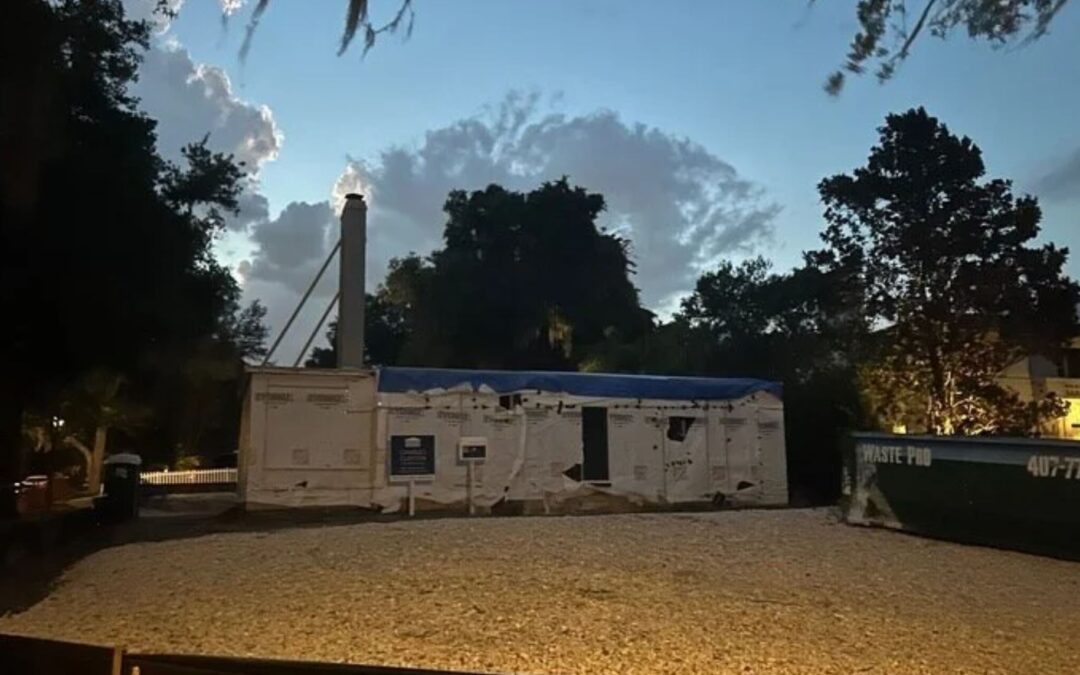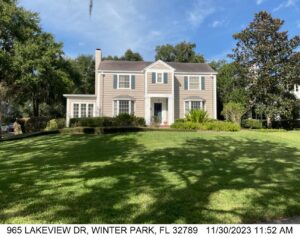An unapproved demo, a $100k penalty and hours of debate
How a demolition in College Quarter led to proposed changes to Winter Park’s Historic Preservation rules, which will be up for a vote Wednesday by the City Commission
May 13, 2025
By Beth Kassab
A year ago, custom builder Charlie Clayton stood before the Historic Preservation Board and apologized, offering to make amends for the unauthorized demolition of a large portion of 965 Lakeview Drive, a 1936 home overlooking Lake Virginia in the College Quarter Historic District.
“I can’t take back what happened,” Clayton told the board on May 8, 2024. “… My interest is not to decimate the resources of the city … I’m not a guy who goes in and tries to destroy the town. I don’t get in trouble like this, but I’m in trouble now.”
Clayton said he even went door to door in College Quarter, one of the largest collections of near-century-old homes in the region, to explain how the second floor of the house was torn down, leaving just the chimney and a small portion of the first floor standing.
The board had only approved the demolition of a garage behind the house and the city ordered work to stop on the project when it learned of the demolition.
Clayton blamed miscommunication with his crew on the site and told the Historic Preservation Board he was prepared to pay $25,000 toward the city’s Historic Preservation Fund and complete the project in a way that would deliver the same end result — a new face on the front of the house that adds additional second-story windows and removes historically inaccurate columns added before the current historic preservation rules were in place.
A photo from the Orange County Property Appraiser shows how the home at 965 Lakeview Drive looked in 2023. The above image shows what the home looked like last year after demolition.
Ultimately, the historic preservation board and staff negotiated the payment to $100,000 and allowed the project to continue. Clayton paid the money the next day.
The board, though, could have issued what some preservationists argue would have been a harsher penalty: Require the homeowner and contractor to reconstruct the home exactly as it was and take back the building variances granted to the project that allowed the homeowner to add square footage to the home.
That choice — a financial penalty or a requirement to build back what was lost and lose valuable variances — will be at the center of the debate expected Wednesday when the City Commission considers proposed changes to the Historic Preservation ordinance touched off by what happened at the Lakeview house.
Commissioners will decide if they want the ordinance to explicitly offer the option of a payment (capped at 30% of the structure’s assessed value) in the event of an unauthorized demolition. Or if they will lean more heavily on the threat of removing variances and requiring reconstruction of an improperly demolished building.
The proposals follow a year of intense debate over the demolition and the historic preservation board’s response.
Ryan Phillips, who owns the home, recorded a conversation with a board member on the sidewalk in front of his house without the board member’s permission and used that to allege he was threatened and treated unfairly.
He spoke at multiple public meetings to allege impropriety over the city’s request that Clayton pay the penalty and lodged state ethics complaints against members of the historic preservation board, a city attorney and former Planning Director Jeff Briggs.
The Florida Commission on Ethics dismissed all eight of those complaints on April 30 because of a “lack of legal sufficiency.”
Phillips and Clayton did not respond to messages seeking comment for this story.
The variances Phillips was allowed to keep for his new construction after the demolition allowed for the home to grow from its original size.
Such variances are key perks for homeowners in historic districts, which enforce architectural standards for the exterior of homes.
Members of Winter Park’s Historic Preservation Board, along with city staff, say they have a job to do: maintain the historic character and authenticity of some 400 properties in the city’s resident-approved historic districts and individually-designated sites.
Their job is not, as retired Planning Director Jeff Briggs once put it, to be the “Historic Replica Board” — or one expected to sign off on every requested demolition or ignore violations of the city’s code. That would render the group a toothless overseer of new construction.
“Basically, it opens the door for everyone to ask for forgiveness and not permission,” Briggs said of violations that harm or destroy historic structures without the board’s approval.
And while the Lakeview house is a recent example of an unauthorized demolition. It’s not the only one.
At the historic preservation meeting last month member Lee Rambeau said changes to the ordinances are needed and she was in favor of adding explicit language about fines.
“I’ve seen a number of properties come before us and the final outcome did not look like what we approved,” she said.
Proposed changes to the ordinance also include stricter application requirements and add a “pre-application” review by the board so that property owners can receive early design feedback before spending a lot of money on detailed renderings. The changes also would require property owners to give more detailed information about the materials they will use and architectural elements.
The change also attempts to cut down on unexpected requests for demolitions after a project starts by requiring applicants to submit a “due diligence assessment” identifying all proposed demolitions or alterations in advance.
A number of historic property owners, including Clayton, spoke out at a community meeting earlier this year against including fines as part of the proposed changes.
At the Historic Preservation meeting in April the board ultimately voted to recommend the version of the ordinance without the fines.
Aimee Spencer, who recently rotated off the board, said that version is potentially harsher on homeowners.
In the case of the Lakeview house, she said, the board attempted to “exercise empathy and kindness” and not penalize the homeowner for work done by the contractor without his knowledge. The project was allowed to proceed as planned rather than have its variances revoked.
But the case became one of what she saw as a “sore winner,” she said.
Wade Miller, who until last month served as board chairman, also said he saw the rebuild requirement and loss of variances as a harsher penalty.
But members of the public and board members spoke against including the fines in the ordinance.
“If that is what I am hearing from the community and members of the board, then so be it,” he said. “… we will see how that plays out … and I think it ultimately will become a much more severe outcome in the future for homeowners of historic properties.”
Betsy Owens, executive director of Casa Feliz, one of Winter Park’s most prominent preservation stories, said a fine could be viewed by some property owners as a cost of doing business rather than a preservation incentive. A requirement to rebuild a demolished structure is considered a best practice in other cities that also value historic preservation such as Coral Gables or Charleston, she said.
“I think the best way to make things right is to have you rebuild what you knocked down,” she said. “Losing variances is a stronger disincentive than a fine.”
WinterParkVoiceEditor@gmail.com



What a class biased policy proposal! With ranch houses being bought for millions for the land to build eggshell oversized bread boxes with a few feet of astroturf on each side, why even bother anymore? People will pay the fine. Maybe replace the historical preservation board with the green area preservation board and save a few more feet of land and reduce flooding risks.
Charlie Clayton is a Winter Park building super hero. The value he has added to the tax base not only from homes he has built but for the value it adds to surrounding properties is second to none.
I can’t imagine anyone would take the second floor off a house if it was in good condition. I lived in college quarter for years and that home had significant wood rot repair that was done frequently of many years by the previous owner.
The new home is gorgeous and will be a jewel in the college quarter collection of homes.
Don’t discourage people from improving their properties. Home owner Phillips should be commended for his investment and quality of remodel he has undertaken.
Food for thought! We live in college quarter with high standards for remodeling to historic standards, right? However, we also have many rental homes who do not take care of their properties. This only hurts our resale values. We need to look to how we can make it affordable to restore these homes without outpricing the market. We have high historic standards for those wanting to make their homes better, but little concern for those who make income renting their homes and minimally caring for it.
No mention of other homes that have been demolished and completely rebuilt in entirely different styles without any penalty, including one a block away on the same lake? This appears to be less about what is “historic” and more about politics and the power to punish affluent people making good faith investments in properties in our city. The Phillips house is undoubtedly one of the best examples of this, yet they and their builder are the ones punished?
The College Quarter has a number of homes in total disrepair, and that would be considered unlivable even by many Rollins students. This situation is entirely unnecessary. Instead of threatening and punishing those willing to invest and improve properties in our town, investment should be *encouraged* and *incentivized*.
There are countless towns with ostensibly “historic” (often a euphemism for “old” and “broken down”) houses. Let’s not let Winter Park be another statistic in this category.
Further, any changes to current rules should “grandfather in” current designated property owners, who purchased their homes in good faith under the rules in place at the time. Retroactively punishing this small group of people seems like an unnecessary and ugly step, and should be re-thought completely.
What? No one is being retroactively punished. No one is being punished by this ordinance being updated.
And one of the main points of the board is to give “incentives” (variances) for owners of designated homes.
It sounds like you’ve been given inaccurate information perhaps?
All homes in the College Quarter designated area can gain “incentives”! Or variances without showing hardship. EVEN if they are a non contributing structure since they are located in the designated historic district. Just depends on who you know.
Put this to a vote of the residents and it will fail. Another government overreach.
You are correct, I misspoke, any designated home OR home in a designated district. Doesn’t matter who you know.
The owner knew well that he bought a historically-designated home. He and the builder were aware of this from the get-go, and used the designation to get significant variances.
Re the condition pre-construction: City officials could have inspected any rot or other damage to approve the demolition. The owner and builder did not choose this obvious path and got caught with an unapproved demolition.
All of the excuses and complaining here are not appropriate.
These folks knew what the correct path was and chose another. The fine is warranted.